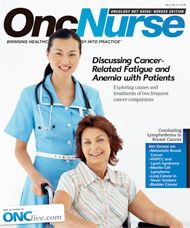Resistance Training and Breast Cancer-Related Lymphedema
Of serious concern among breast cancer survivors is breast cancer-related lymphedema (BCRL), which causes chronic swelling in the arm or hand where axillary lymph nodes were dissected or radiation therapy was administered. The exact etiology and pathophysiology of BCRL is multifactorial and not completely understood.
Of serious concern among breast cancer survivors is breast cancer-related lymphedema (BCRL), which causes chronic swelling in the arm or hand where axillary lymph nodes were dissected or radiation therapy was administered. The exact etiology and pathophysiology of BCRL is multifactorial and not completely understood.1
Traditionally, breast cancer survivors were advised not to perform strenuous upper body exercises, such as resistance (weight) training, because these activities were thought to promote lymphedema.1 However, recent research findings, including systematic reviews,1,2 demonstrate that resistance training does not increase either a woman’s risk for or the worsening of BCRL.
McKenzie and Kalda3 measured the effects of a resistance, flexibility, and aerobic training program on lymphedema secondary to breast cancer treatment in 7 women randomized to the intervention against those who served as controls. Some of the women in this study had experienced lymphedema prior to study enrollment. Despite the small sample size, the findings showed no change in arm circumference or volume at the exercise program’s completion. No adverse effects were reported, and those who participated in the program noted improvements in their affected arms, such as softening of hardened areas, reduced pain and swelling when using their arm to perform activities of daily living, and reappearance of hand tendons.
Ahmed and colleagues4 evaluated the effects of supervised upper and lower body weight training on lymphedema in 45 breast cancer survivors enrolled in the Weight Training for Breast Cancer Survivors study. Their time post-treatment ranged from 4 to 36 months, and all had undergone axillary dissection. Thirteen participants had lymphedema at the start of the study. The researchers found that resistance training did not increase the onset of or exacerbate lymphedema in any of the patients.
Hayes et al5 conducted a randomized controlled trial to determine the effect of a supervised exercise program on lymphedema in women who completed breast cancer treatment 6 months earlier. Thirty-two women were randomized to an intervention group that included 20 supervised group aerobic and resistance sessions over 12 weeks, or a control group where patients performed usual activities. At the conclusion of the study, no significant differences in lymphedema status existed between the two groups; however, two of the participants in the intervention arm had no measurable lymphedema at the end of the study. The authors concluded that participating in exercise is safe for women with lymphedema and that exercise does not exacerbate swelling.
Schmitz and associates6 conducted a randomized, controlled trial to determine the effects of resistance training on women with BCRL. Of the 141 women enrolled, 71 participated in weight training in a group class setting, and 71 served as controls. At the end of the study, weight lifting did not significantly affect the severity of BCRL, but it did reduce the number and severity of arm and hand symptoms, increased muscular strength, and decreased the number of BCRL exacerbations.
Based on current evidence, BCRL is not a side effect of upper body resistance training under supervised conditions, in some women, BCRL may be reduced by supervised resistance training. Post-treatment, the oncology team can guide you and your patient in selecting therapeutic activities if BCRL is a concern, based on the time post-diagnosis, type of surgical treatment, and extent of lymph node removal. Exercise prescription for resistance training should be made in collaboration with the oncology team and qualified fitness professionals experienced in BCRL. A number of organizations provide guidance or suggestions for exercise in individuals with and at risk for lymphedema, including the National Lymphedema Network (www.lymphnet.org) and the American Cancer Society (www.cancer.org/docroot/MIT/content/MIT_7_2x_Lymphedema_and_Breast_Cancer.asp).
Lisa Marie Bernardo, PhD, MPH, RN, HFS, is an associate professor at the University of Pittsburgh School of Nursing. She is an ACSM-certified Health Fitness Specialist, an ACSM/ACS Cancer Exercise Trainer, and an ACSM-licensed Wellness Coach.
REFERENCES
1. http://tinyurl.com/ycdples 4. http://tinyurl.com/y9jyfqb
2 Commerce Drive
Cranbury, NJ 08512
All rights reserved.
